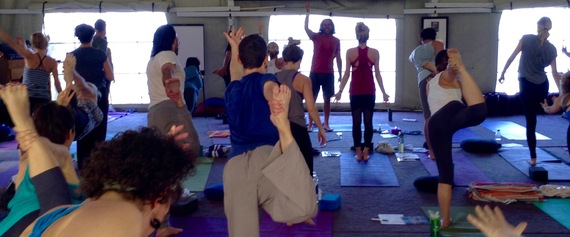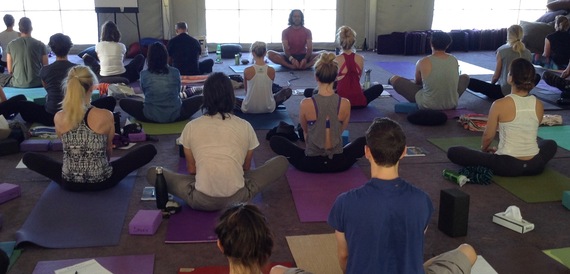Last year I was on a panel at a yoga conference where Arun Deva stated, "Yoga and business are like oil and water." I taught yoga at 24 Hour Fitness for three years and I quickly learned to reframe teaching 40-75 students per class as seva, seeing I was only paid $25 per class, which was much less than employees at Costco earn per hour if you include my time plus expenses such as parking and health insurance. (24 Hour Fitness was subsequently sued and forced to raise their rates and offer health insurance. After the suit I received part of a settlement compensating me for all of the classes I taught at sub-livable wages.)
I know countless yoga teachers -- even highly acclaimed and respected teachers (intentionally avoiding the word "famous" here) -- who do not have health insurance. The irony of a healer or "lightworker" -- or more precisely for most of us, "Wounded Healer" -- who cannot afford adequate healthcare should not be lost on you.
The yoga community's laissez-faire attitude of "It's all good!" may ultimately become its undoing as thousands of freshly minted yoga teachers flood the market and vie to create their own "brands," lure "clients," and sell "product." Voila! Yoga meets capitalism! Om namah shivaya baby! Buy my rad "Namaste Bitch!" t-shirt so I can laugh all the way to the bank until someone else comes out with an even cooler product!
It is ironic that the situation regarding yoga teachers has become not dissimilar to the Wall Street/Occupy Movement antinomy. If you discount bored housewives and trustifareans, I estimate that less than 1% of yoga teachers are "living in abundance" (as we refer to dosh here in Rishikesh West); yet I haven't heard of any of the 1% of yoga teacher millionaires helping the thousands of teachers struggling beneath them stay healthy. The passive attitude of "yoga as a business will figure itself out" is allowing corporations to determine what the market will bear, namely, "How little can we pay our yoga teachers in our attempt to return a profit to the investment bankers who floated our groovy studio(s)? Ommmmmmmmmmm"
Ten years ago I was sitting with Ganga White when Yogaworks bought the yoga studio he founded in 1966, Larchmont Center for Yoga. We feared the McDonaldization of yoga was near. We were wrong. Yogaworks doesn't appear to be thriving on their subscription model and I haven't heard anything positive from Yogaworks teachers except regarding their health insurance plan. The market is wide open for Core Power Yoga to McDonaldize yoga, which can only be done with deep pockets similar to the way Amazon won us over by losing money on every sale for ten years but in the process creating tremendous brand loyalty.
Groupons for yoga studios are building neither community nor loyalty -- they're just making teachers angry for having to teach students at $1 per head instead of $5 or $6. Many yoga retreats are being cancelled due to lack of participants (I feel wildly blessed to have sold out Esalen earlier this year); it seems like yoga festivals are doing well but when I attended Wanderlust it appeared to be teeming with housewives who were more in dire need of a weekend furlough from their kids and some retail-therapy than wanting to delve into the Hatha Yoga Pradipika.
I shant even mention Yoga Journal's non-contribution to anything other than their own advertisers. Ommmmmmmmmmm.
I've never invited a fellow teacher to a class or workshop without adding, "Please come as my guest." In my parallel universe, yoga teachers share freely with each other; they don't see each other as competition or as potential clients. In 100 years people may look back on some of our peers -- maybe even on YOU -- as the Freuds and Jungs of modern yoga. We need to learn from each other and constantly evolve and grow together, not in isolation. But can yoga teachers afford to explore other teacher's classes at $24 a pop when they're paid little more than that for teaching?
We're going to have to figure out a more sustainable business model than cults of personality.
Speaking of which, who's going to inform all of those failed actors signing up for $3,000 Yoga Teacher Trainings that they may as well go to bartending school, that yoga teacher is a dead-end career, that the skill-set transfers nowhere, that there is no place to go but sideways or down, that they will probably grow to hate what they love in a few years, that they'll never be able to retire, that they probably won't have adequate health insurance, and that it will even be difficult for them to ever take a vacation unless they're also ingenious entrepreneurs or marry someone wealthy?
If yoga is a billion dollar industry then why doesn't it act like one? Actually, why can't we act BETTER than the way business is currently conducted in America? We are failing to be the change we want to see in the world. We all read the Yoga Sutras and the Gita and the Upanishads, we all know the yamas and niyamas regarding ethical conduct, as well as the Buddha's 8-limb path. And yet, the lack of compassion, love, and ethical conduct resulting from ardent competition and a scarcity mentality has made us renounce the very principles that we should espouse.
Why can't we show the greedy and conniving Wall Street "survival of the fittest" 1% that there is a better way? That there's enough abundance to make this a win-win-win situation for the yoga studios, yoga teachers, and yoga students?
With the exception of a handful of authors such as Matthew Remski, Michael Stone, Douglas Brooks, Chris Courtney, and Julian Walker, I am dismayed by the dearth of intelligent dialogue about the future of yoga in North America. And yet a video of a sprightly woman doing asanas in the buff or handstands in her panties can get hundreds of thousands of viewers.
The International Association for Yoga Therapists' Educational Standards manifesto seems like a noble start for codifying yoga. Websites such as www.Yogatrail.com seem like they could democratize the market and allow for honest reviews and evaluations of teachers.
We need to figure out a business model that the people on Wall Street want to emulate, some new paradigm that allows all of us to be considerate and respectful of each other's talents and journeys. The Bill Gates' model of "Let's squash all of the competition, get rich for being in the right place at the right time, then donate our artificially inflated earnings to buy malaria nets in China for kids in Africa in a feeble last grasp for redemption after 40 years of bullying others" shouldn't impress anyone save a few kids in Africa. Every small yoga studio owner with an employee profit participation plan and adequate health insurance for his teachers should be Man of the Year, not Senor Bill.
I heard Rod Stryker say, "Nobody cares whether you can put your legs behind your head in your coffin." Yoga is a way of being that can help the practitioner cultivate ease and equanimity, but these traits don't seem to mesh well with our particular brand of ego-driven, winner-take-all, highly-competitive capitalism.

